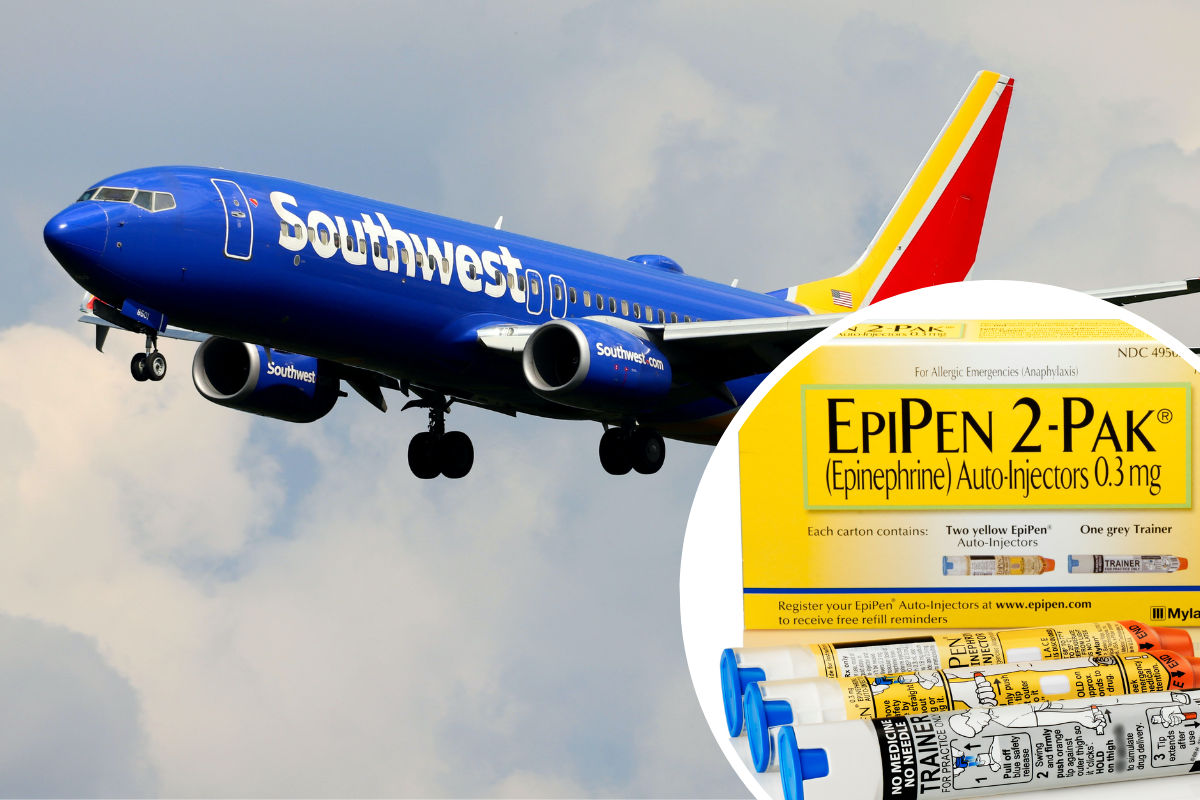
A physician who suffered a dramatic and terrifying life-threatening allergic reaction onboard a recent Southwest Airlines flight is urging the airline to stock EpiPen autoinjectors onboard all of its flights after discovering that the carrier only carries vials of Epinephrine in its emergency medical kits.
Lindsey Ulin, a resident physician in the Department of Internal Medicine at Brigham and Women’s Hospital in Boston, was flying with Southwest from Phoenix to Austin when she suffered a severe allergic reaction without warning.
Many people who know they suffer from a severe allergy carry their own EpiPens or generic equivalent, but Ulin has never suffered a severe anaphylaxic shock before hives suddenly started breaking out on her face and chest during the Southwest flight.
Ulin says she was struggling to breathe and could feel her throat tightening but she managed to flag down a flight attendant and ask for an EpiPen. At this point, Ulin discovered Southwest doesn’t carry epinephrine autoinjectors in its medical kit.
Since 1986, the Federal Aviation Administration (FAA) has mandated that airlines carry epinephrine in their emergency medical kits in the form of single-dose ampules, but it has to be administered via syringe by a trained medical professional.
Flight attendants are not trained to administer the epinephrine found in an airline medical kit and must rely on a physician or other trained medical professional coming forward during an inflight medical emergency.
In contrast, an EpiPen autoinjector doesn’t need any special training and can quickly and safely give a life-saving shot of adrenaline within seconds. Importantly, nearly anyone can use an EpiPen, including flight attendants.
EpiPens are, however, very expensive. In fact, after pharmaceutical giant Mylan bought the rights to the EpiPen brand, the cost of a two-pack surged by more than 500 percent to over $600 in 2018.
In Ulin’s case, luckily, another medical doctor was onboard the flight and offered to help.
In a tweet addressed to Southwest, Ulin wrote: “I am only alive today because another physician on the plane figured out how to safely give me the form of epi(nephrine) in your kit, something neither a flight crew or the general public will likely know how to do.”
“Depending on either a healthcare provider being on the flight or someone on the plane having an Epipen with them is not a safe or effective emergency preparedness strategy,” Dr Ulin continued.
“Southwest Airlines you have the opportunity to make this right and your passengers’ lives depend on it.”
The other doctor onboard Ulin’s flight managed to administer enough epinephrine to stabilize her before the plane landed in Austin, and she was taken to the hospital.
Worryingly, airlines sometimes don’t even have to carry ampules of epinephrine because the FAA can issue exemptions when third-party kit providers struggle to get hold of stock.
Related
Mateusz Maszczynski honed his skills as an international flight attendant at the most prominent airline in the Middle East and has been flying ever since... most recently for a well known European airline. Matt is passionate about the aviation industry and has become an expert in passenger experience and human-centric stories. Always keeping an ear close to the ground, Matt's industry insights, analysis and news coverage is frequently relied upon by some of the biggest names in journalism.








Epi-pens are very expensive but I agree they should have them on every aircraft. They should also have Narcan but I bet they don’t.
It’s going to end up being another $.50 or $1.00 attached to every ticket… and I think it should be broken down in the tax section just like the security fees… so people can SEE where the money is going… and that it’s earmarked for such services.
I’m not saying I’m for or against the idea… but I would rather pay the dollar than be diverted or have someone die on a flight for something avoidable. Because it’s either a dollar now… or after the airlines get sued and MILLIONS are paid out… prices will be more impacted.
Airlines are not married to meeting only mandates if the FAA. If – like training and certifying in CPR for example – each plane be required to have one (1) attendant trained as certified to use the EpiPen injection prep and at least four (4) doses available in the emergency medical kit – with sign off by the street that they are certified AND verified the med kit held two (2) EpiPen units with 4 doses available before the plane was approved for take off procedures begin AT THE FLIGHT POINT OF FBO ORIGIN, a long with CPR Certification as a trainer instructor for both defibrillator and epipen as able to over see the and direct others use of those two pieces of equipment, then the lousy $1.00 medical
equipment surcharge might be the highlight of the flight as a live saving event mid-air. And save airlines $mm in law suits from over worked attendants mis-communications with passengers, who could die from simple, avoidable medical condition complications in the air.
I was recently trained by a Physician’s Assistant how to draw up a dose, switch needles, and inject myself. It took at most 5 minutes. Why can flight attendants be trained to do so? I rather see a big vial of epinephrine and needles available, since that allows for multiple shots and can be used to treat other conditions.